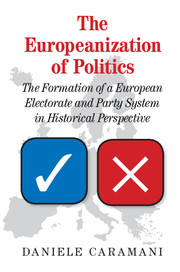 The Europeanization of Politics
The Europeanization of Politics Published online by Cambridge University Press: 05 November 2015
At the turn of the 20th century politics in Bulgaria was dominated by a large liberal party representing the democratically oriented bourgeoisie and independent entrepreneurs who favoured constitutionalism, parliamentarism, and social policies while the main opposition was constituted by conservatives of the richer upper classes and clergy. These elitarian parties ruled until World War I when the challenge coming from the parties of the “masses” – the socialist BRSDP and the agrarian BZNS – became majoritarian among the enfranchised male electorate, only to be in turn overtaken as soon as 1920 by the Bulgarian Communist Party. An unstable party system consisting of socialists, agrarians, and communists on the left and liberals and conservatives on the right managed to survive until 1931 – the last democratic election until the fall of the Berlin Wall in 1989.
Such early party system development is typical of Europe and appears in classical accounts of political parties from Ostrogorski (1902), to Michels (1911), Duverger (1954), and Rokkan (1970), among many others. In fact, it is the story of most European party systems whether of Britain and its early parliamentarism; of Germany, Italy, and Switzerland as they formed from the struggle for national unification; of Austria and Hungary and the other nations emerging from the break-up of multi-national empires in Central and Eastern Europe; or of the Nordic countries. Indeed, a contemporary commentator simply described the Bulgarian party system as “European”. The early opposition between liberals and conservatives during the periods of restricted suffrage, the rise of parties of mass mobilization with the extension of franchise to workers and peasants, the division of the left into socialists and communists after the Soviet Revolution of 1917, and even the breakdown of democracy under totalitarian ideologies in the 1930s are common features of electoral history during the constituent phases of European party systems. Such commonality persists in later phases of electoral development after World War II with the rise of Christian democracy and the welfare state, the new politics of emancipatory values eventually leading to green parties, and the radical-right politics of anti-globalization and anti-immigration which have recently manifested in populist parties throughout the continent.
To save this book to your Kindle, first ensure [email protected] is added to your Approved Personal Document E-mail List under your Personal Document Settings on the Manage Your Content and Devices page of your Amazon account. Then enter the ‘name’ part of your Kindle email address below. Find out more about saving to your Kindle.
Note you can select to save to either the @free.kindle.com or @kindle.com variations. ‘@free.kindle.com’ emails are free but can only be saved to your device when it is connected to wi-fi. ‘@kindle.com’ emails can be delivered even when you are not connected to wi-fi, but note that service fees apply.
Find out more about the Kindle Personal Document Service.
To save content items to your account, please confirm that you agree to abide by our usage policies. If this is the first time you use this feature, you will be asked to authorise Cambridge Core to connect with your account. Find out more about saving content to Dropbox.
To save content items to your account, please confirm that you agree to abide by our usage policies. If this is the first time you use this feature, you will be asked to authorise Cambridge Core to connect with your account. Find out more about saving content to Google Drive.